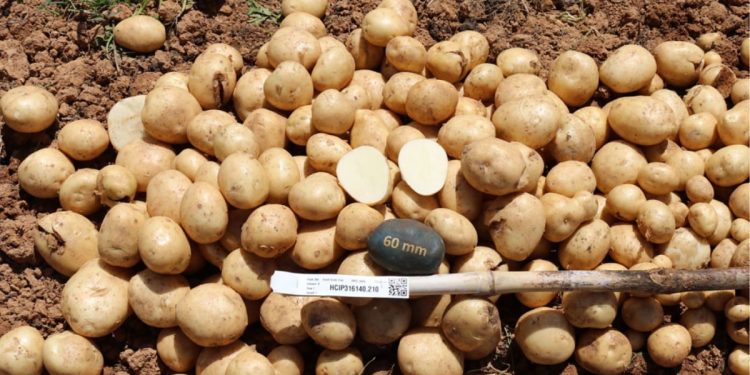#PotatoFarming #TAP5Project #HCIP210 #AgricultureInnovation #Public-PrivatePartnership #FoodSecurity #SmallholderFarmers #Climate-Resilient Varieties #SustainableAgriculture #VietnamAgriculture
In the lush landscapes of Vietnam, a revolution in potato farming is underway. The HCIP210, a result of the synergistic efforts of the International Potato Center (CIP) and HZPC Holdings BV, has emerged as a beacon of innovation in the agriculture sector. Traditionally, creating a new potato variety is a decade-long process, but the TAP5 project has rewritten the rules, bringing HCIP210 to life in just eight years.
This cream-fleshed potato variety is not just a novelty; it’s a game-changer for Vietnamese farmers. Boasting a high yield potential and adaptability to diverse conditions, HCIP210 stands resilient against late blight and viruses like PVY and PVX. What sets it apart is its extended dormancy period of over 120 days, ensuring a consistent supply of high-quality ware potatoes well beyond the harvest season.
Large-scale on-farm registration trials across six locations in Vietnam have confirmed HCIP210’s superiority. Outperforming commercial checks like Marabel and PO3, this variety has recorded up to 17% higher marketable tuber yields in specific regions. For smallholder farmers, this means reduced reliance on chemical interventions, thanks to HCIP210’s robust resistance to major biotic stresses.
A standout feature of HCIP210 is its adaptability to highland regions, making it invaluable for off-season cultivation. This adaptability not only secures a stable supply but also reduces the need for potato imports during periods of scarcity—a crucial aspect for food security.
But how did the TAP5 project achieve this remarkable feat? Initiated in 2016, this public-private partnership between CIP and HZPC, supported by the Syngenta Foundation for Sustainable Agriculture (SFSA) and USAID, aims to enhance food security and income for resource-poor farmers in Asia and Africa. By blending traditional and modern breeding techniques, including molecular markers, the partnership has cracked the code for developing early-maturing, climate-resilient potato varieties.
The collaboration doesn’t end at HCIP210. HZPC, with its rich genetic material, contributes resistance to various challenges, including late blight, PVY, PCN, common scab, and powdery scab. The royalties generated from commercial sales will be reinvested in CIP’s ongoing potato breeding efforts, addressing emerging challenges like bacterial wilt.
The success in Vietnam is just the beginning. Promising clones identified will soon reach other target markets in Asia and Africa, including India, Bangladesh, Indonesia, Tanzania, Kenya, and Ethiopia. The impact of this partnership extends gratitude to SFSA, USAID, HZPC Holding BV, and NARS partners who played a pivotal role in this journey.
As HCIP210 paves the way, the future holds promise for potato farming in tropical and subtropical regions. This public-private partnership is not just about growing potatoes; it’s about cultivating opportunities and prosperity for smallholder farmers globally. Get ready for a harvest of delicious and resilient potatoes, and stay tuned for more exciting releases from the TAP5 project.







